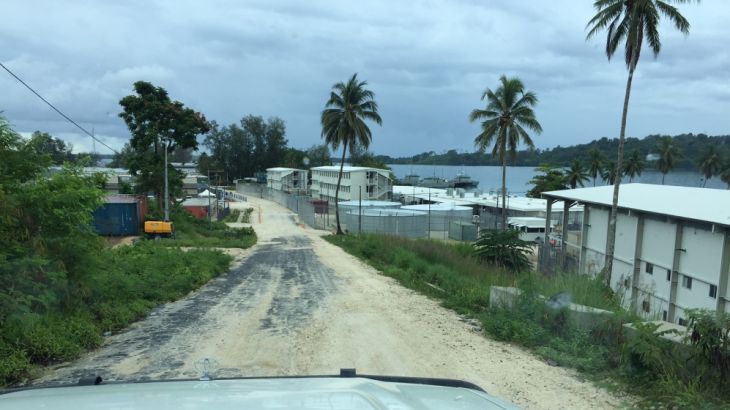A glimpse of Australia’s Manus Island refugee prison
Nearly 1,000 men have been locked up in detention camp in Papua New Guinea since they tried to reach Australia by boat.

Manus Island, Papua New Guinea – “We have lost hope,” said Aziz.
“It is like hell,” Behrouz Boochani told me.
Keep reading
list of 4 itemsUN report charts lethal cost of migration over past decade
Conflict, climate, corruption drive Southeast Asia people trafficking: UN
Bodies of three Rohingya found as Indonesia ends rescue for capsized boat
“We are human,” implored Behnam Satah. “We’re not animals.”
These words were told to me by refugees in phone conversations I could have had from anywhere.
But somehow being on Manus Island – physically close to those I was talking with – made their words resonate far more.
I could understand better the physical conditions of their imprisonment: the heat, the humidity and the mosquitoes.
The mental anguish, of course, I could still only imagine. I was only on Manus Island for three days.
They have been there – locked up – for more than two years.
In July 2013, the Australian government decided that asylum seekers who tried to come to Australia by boat should instead be deported to Papua New Guinea or Nauru.
There was the humanitarian argument: deterring people from getting on boats to Australia would mean fewer drowning.
And there was, more importantly, the politics.
I reported from enough western Sydney swing seats in the run-up to the 2013 election to know how irritating critical voters found “queue-jumping refugees”.
But even if those arguments have merit – and some in Europe now think they do – it is impossible not to sympathise with those who have become the policy’s human legacy.
That’s what I wanted my report from Manus Island to be about: the people whose distress is integral to the Australian policy’s “success”.
![Nearly a 1,000 men are housed in the detention camp [Andrew Thomas/Al Jazeera]](/wp-content/uploads/2015/12/a38050ce113a4ebdb087437b526840ab_18.jpeg)
The interviews with detainees were straightforward enough. Although mobile phones are banned inside what is – really – a prison, it seems lots of men inside have “paid” cigarettes to cleaners to bring some in.
Forty-eight refugees are now living “freely” anyway, in a transit camp much closer to town.
I interviewed four of them; they’ll appear in a later report. They claimed the transit camp was worse than the prison. At least inside that, they said, they had some protection.
Manus’ local community – one said – resents them. He said he’d been beaten up twice in the last few weeks.
Well over 100 men in the prison are also eligible to live in the transit centre. But they are refusing to go, because of fears about life outside.
![The prison was established as a 'deterrent' for refugees trying to reach Australia [Andrew Thomas/Al Jazeera]](/wp-content/uploads/2015/12/f737585507844d5f88b0f940f29e4e3b_18.jpeg)
Indeed, locals I spoke to – while grateful for the jobs the camps have created – didn’t have much respect for the refugees.
One man called Belden – who said he worked in the prison – was scathing.
“They are not normal people in there,” he said. “They’re crazy. Like animals.”
Around Manus itself, Australia’s money is obvious. The pot-holed road from the airport to town is being fixed with Australian men and machinery. There’s a new market building, and the police station is being rebuilt.
We were, of course, keen to get shots of the prison itself. Hiring a boat got us close. To get inside, a former worker agreed to sit in the front passenger seat of our vehicle, effectively “endorsing” us as we were waved in by security guards at the gate.
Plenty of foreigners – mostly, but not exclusively, Australians – work in the prison. So we weren’t that unusual. But we didn’t dare to stop inside.
Our contact in the car was very nervous of what might happen if we did.

We filmed through the window – a glimpse of life inside: giant marquee tents for accommodation; a football match with both refugees and Western-looking men on the pitch.
In my time in Australia I’ve done dozens of reports about Australia’s policies towards refugees. I’d been to Nauru before – although they won’t let me back.
But to be on Manus was informative: it is where the legacy of Australia’s policy live. Whatever the politics, those there should not be forgotten.
And are they “genuine” refugees? It’s the question often asked in Australia. My answer: they’ve spent more than two years locked up in some pretty awful conditions, with the option at any time of a free flight home and money from Australia’s government to go. They haven’t.
Some say Manus is “hell”. It is, certainly, bad. The alternative, by that logic, must – surely – be worse.
